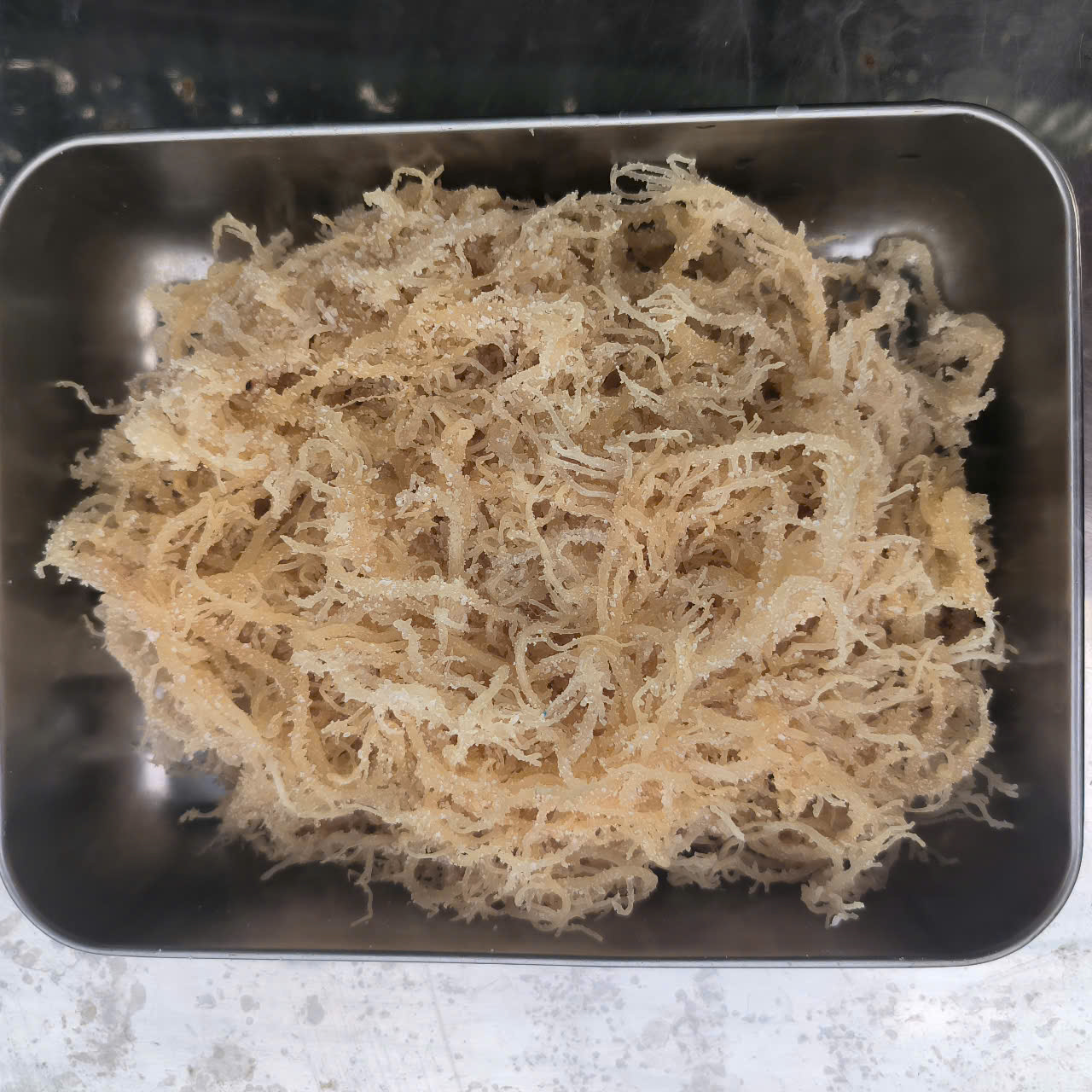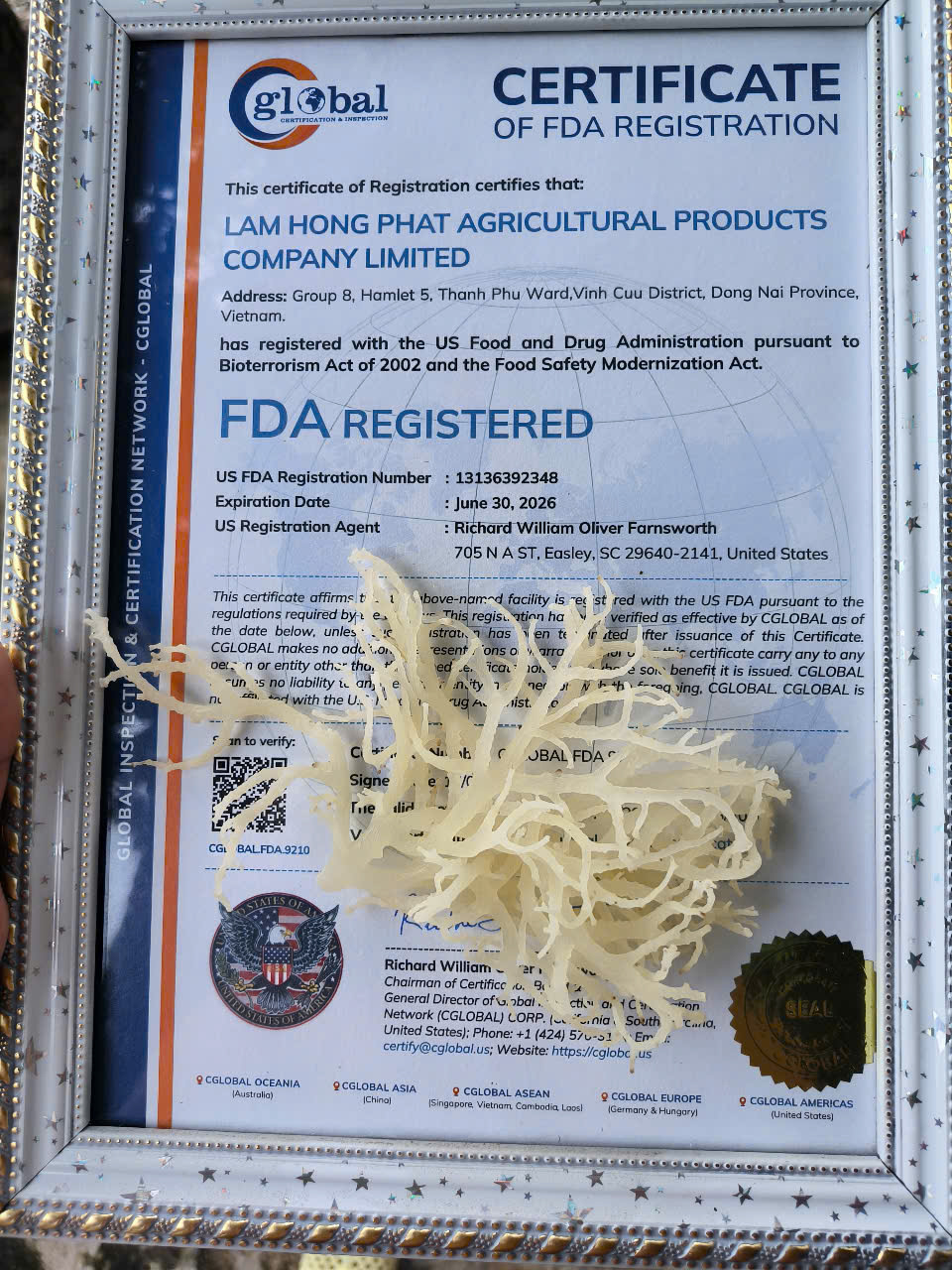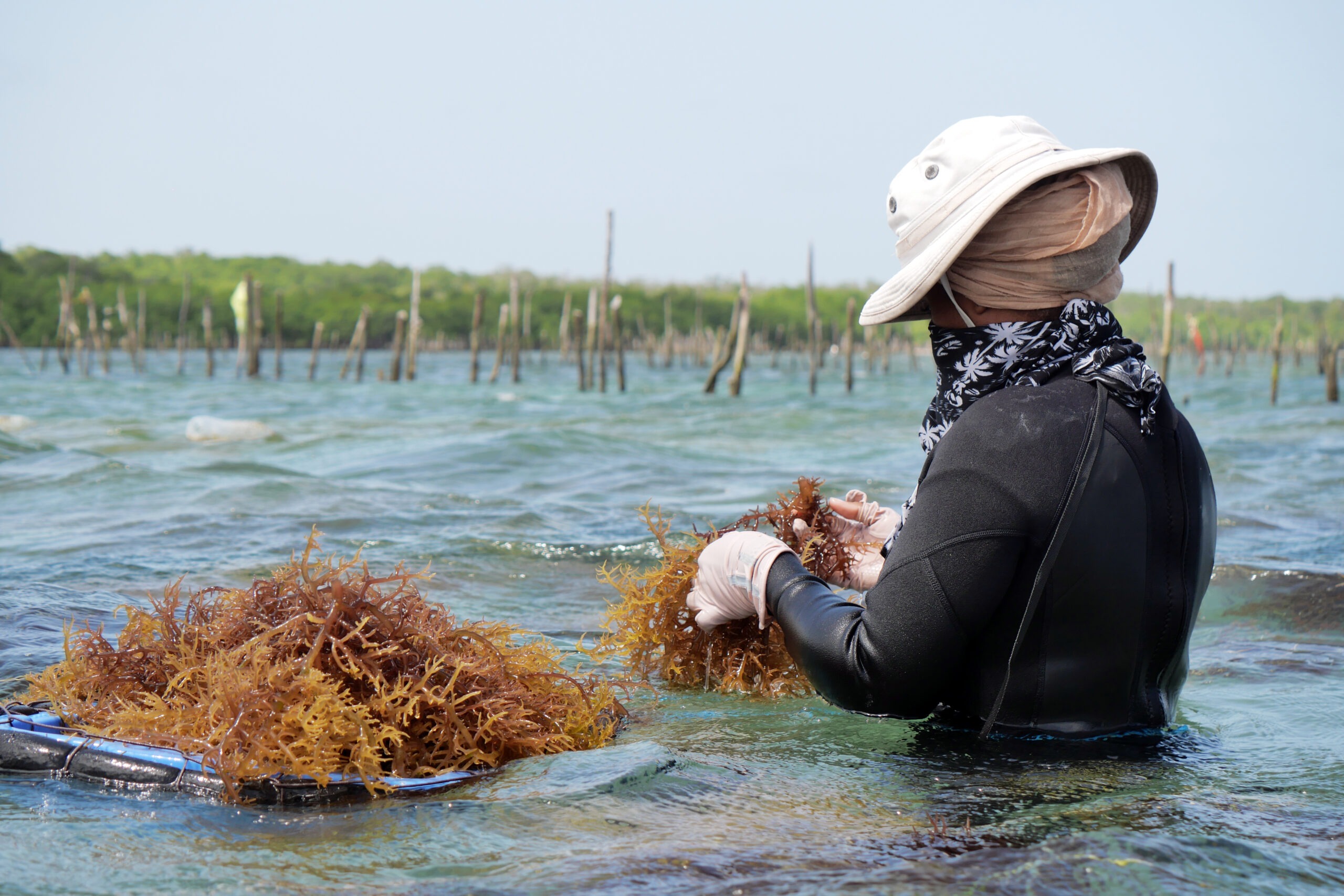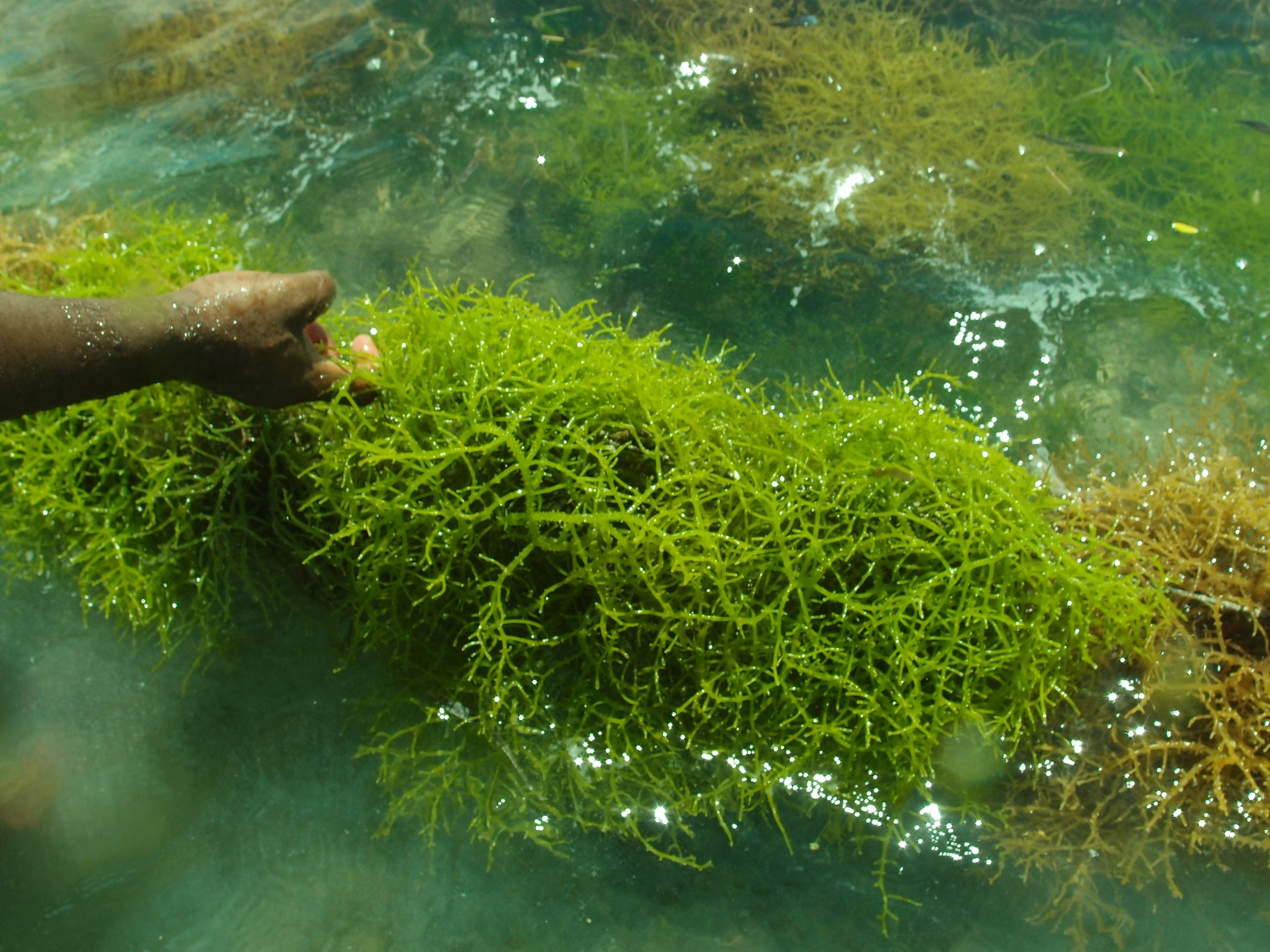Why is organic sea moss gaining traction in marine biotechnology? The answer lies in its unique combination of purity, sustainability, and functional value. As industries race to develop safe, natural alternatives to synthetic compounds, organic sea moss is emerging as a go-to raw material for biotech applications from vegan skincare to medical-grade supplements. This article will explore the reasons behind organic sea moss’s growing importance in marine biotechnology.
1. Key marine biotechnology compounds in organic sea moss
Organic sea moss, particularly species like Eucheuma cottonii and Chondrus crispus, contains compounds valuable across industries:
- Carrageenan: A natural polysaccharide used to thicken and stabilize foods, cosmetics, and medicines.
- Fucoidan: A compound that helps boost immunity and reduce inflammation, great for wellness and recovery.
- Vitamins & minerals: Rich in iodine, magnesium, calcium, iron, and potassium essential nutrients for daily health.
- Phycobiliproteins: Colorful plant-based antioxidants often used in skincare and pharmaceutical products for their cell-protecting properties.
- Lectins & peptides: Natural compounds with promising effects in fighting viruses, bacteria, and even supporting cancer treatment.
These naturally occurring compounds are at the core of sea moss’s biotech appeal

Organic sea moss offers carrageenan, fucoidan, minerals, antioxidants, and bioactives
2. Why is organic sea moss preferred in marine biotechnology?
Organic seaweed is cultivated without chemical fertilizers, pesticides, or harmful additives - making it ideal for biotech applications in cosmetics, pharmaceuticals, and supplements where purity is critical. Certified organic sea moss, such as Eucheuma cottonii and Chondrus crispus, ensures non-GMO sourcing, full traceability, and compliance with international clean-label standards.
Unlike conventional seaweed, which may be harvested from polluted waters and processed with chemicals, certified organic sea moss must meet strict standards:
- Certified organic sea moss must be cultivated in clean, uncontaminated waters, free from chemical fertilizers, industrial runoff, and pollutants. The water source is regularly tested to ensure safe farming conditions.
- Conventional (non-organic) seaweed may be harvested from uncontrolled environments, which can be contaminated with heavy metals (like lead or arsenic), harmful bacteria, or microplastics. If not handled properly, this can pose risks to consumer health.
- Grown in clean, tested waters free from industrial runoff and pollutants
- Naturally sun-dried and rinsed—never bleached, irradiated, or chemically treated
- Fully traceable from harvest to packaging
- Labeled with trusted certifications like USDA Organic or EU Organic
These certifications not only protect consumer health but also boost brand credibility and export readiness. Though organic sea moss may cost more, its safety, sustainability, and clean-label appeal make it a preferred choice for premium markets.

Certified organic sea moss ensures purity, safety, traceability, and eco-friendly farming
3. What is the benefit of Non-GMO sea moss in health products?
Today’s consumers are increasingly attentive to product labels and “Non-GMO” is among the most trusted claims they seek. When it comes to sea moss, choosing a Non-GMO source means more than just marketing advantage.
Non-GMO sea moss represents a safer, cleaner, and more transparent option, aligning with the values of those who prioritize honest, natural food and ingredients. For use in supplements, skincare, or clean-label formulations, Non-GMO seaweed helps manufacturers comply with regulatory standards and meet the expectations of consumers in Europe, the U.S., and Canada.
4. What is wildcrafted sea moss and why is it popular?
Wildcrafted sea moss is harvested directly from its natural marine environment rather than being cultivated in managed sea farms. It’s considered by some to be more nutrient-dense and rich in natural minerals, as it grows under natural stressors that may enhance the development of bioactive compounds.

Wildcrafted sea moss offers rich nutrients but requires strict quality control
However, wildcrafted sources require stringent environmental and quality oversight. Pollution or overharvesting in natural waters can compromise product safety and efficacy. Reputable suppliers mitigate these risks by conducting regular lab testing, providing location documentation, and obtaining harvest certifications.
For many health-conscious consumers and biotechnology firms, wildcrafted sea moss represents a premium option, provided it meets established safety and sustainability standards.
5. What are the applications of sea moss compounds across industries?
Sea moss species like Eucheuma cottonii and Chondrus crispus, are rich in functional compounds such as carrageenan, fucoidan, polyphenols, phycobiliproteins, vitamins, and minerals. These bioactives support a wide range of industrial applications:
5.1. Food & beverage industry
Carrageenan extracted from sea moss is a natural thickener and stabilizer, widely used in clean-label formulations. It improves texture, shelf-life, and consistency in products like plant-based milks, meat alternatives, desserts, soups, and sauces - without synthetic additives.
5.2. Nutraceuticals & dietary supplements
Sea moss is valued for its iodine (supports thyroid), fucoidan (immune and anti-inflammatory benefits), prebiotic fiber (gut health), and over 92 trace minerals. These compounds are key ingredients in wellness products targeting energy, detox, and immunity.

Seaweed supplements support thyroid, immunity, digestion, and overall mineral intake
5.3. Cosmetics & personal care industry
In cosmetics, seaweed extracts help keep the skin moist, strong, and youthful. That’s why they’re a great fit for vegan, organic, or sensitive skin products. Seaweed can thicken products without using synthetic chemicals, thanks to its natural gelling power. They’re used in moisturizers, serums, anti-acne creams, shampoos, and even toothpaste
With traceable origins and clean bioactivity, organic sea moss is driving innovation in marine biotechnology - helping brands create safer, more effective products that align with consumer demand for purity and sustainability.
6. Lam Hong Sea Moss and the rise of clean-label seaweed solutions in Vietnam
In Vietnam, Lam Hong Sea Moss is one of the leading companies aligning with this global shift toward organic and regenerative aquaculture. Specializing in high-quality Eucheuma cottonii (commonly known as red seaweed), Lam Hong Sea Moss combines traditional farming techniques with modern quality controls to supply traceable, food-safe, and export-ready sea moss for a range of industries.
Our farming zones are located in clean coastal waters, rigorously tested for contaminants, and aligned with organic production standards. Whether for food, cosmetics, or biotechnology, Lam Hong’s seaweed is a trustworthy choice for brands looking to integrate clean-label marine ingredients into their product development pipelines.
By choosing trusted suppliers like Lam Hong Sea Moss, businesses not only ensure safety and sustainability - but also tap into a growing global demand for natural, transparent, and health-driven innovations from the ocean.






